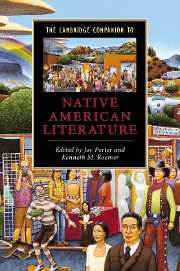Book contents
- Frontmatter
- Introduction
- Timeline
- Part I Historical and cultural contexts
- Part II Genre contexts
- 4 Non-fiction prose
- 5 Native American life writing
- 6 America’s indigenous poetry
- 7 Pre-1968 fiction
- 8 Fiction
- 9 American Indian theatre
- Part III Individual authors
- Bio-bibliographies
- Further reading
- Index
- Series List
5 - Native American life writing
from Part II - Genre contexts
Published online by Cambridge University Press: 28 May 2006
- Frontmatter
- Introduction
- Timeline
- Part I Historical and cultural contexts
- Part II Genre contexts
- 4 Non-fiction prose
- 5 Native American life writing
- 6 America’s indigenous poetry
- 7 Pre-1968 fiction
- 8 Fiction
- 9 American Indian theatre
- Part III Individual authors
- Bio-bibliographies
- Further reading
- Index
- Series List
Summary
Autobiography understood as a literary genre only came into being in what is now the United States in the 1960s, beginning with publications by Georg Misch, Georges Gusdorf, William Spengemann, and Roy Pascal. Up until that time, autobiography, like biography, was simply considered history - another mode of recording experiences of the past. But while scholars such as James Olney were laying the foundation for the field of autobiography studies (outlining its parameters and characteristics), other scholars, particularly those focused on feminist and ethnic American self-narrations, countered with alternative definitions of the form and its subjects.
While the debates about how to define the emergent field of autobiography raged (and they continue to do so), in the 1970s deconstructionists proclaimed the death of “the subject” (the biographical person and/or the self) and, as a natural consequence, the demise of autobiography. But the lively debates about whose lives should be included in autobiography and in what forms could not be stopped by a theoretical pronouncement. Instead, acknowledging or ignoring the deconstruction of the subject, scholars began to articulate the many selves (women, people of color, working class and poor people) disallowed by the founding formulations of autobiography theorists who had focused primarily on the literary productions of elite Western men.
Autobiography – most often defined concisely and canonically as “the story of one’s life written by oneself ” – is widely understood to be a Western form arising during the Enlightenment. Associated with the term was a pronounced belief in the idea of the autonomous, unified, universal self, a concept that, beginning in the 1970s, was historicized by scholars interested in including the self-narrations of women and people of color who often did not share such a self-conception. Since then the essentialist formulation of an autonomous, unified, and universal self (revealed to be Western and male) has been reformulated as relational, multiple, and localized – historically, socially, and culturally constructed.
- Type
- Chapter
- Information
- The Cambridge Companion to Native American Literature , pp. 125 - 144Publisher: Cambridge University PressPrint publication year: 2005
- 3
- Cited by



